Fyne Ales
A Place Like Nowhere Else
Escrito por Jesús Olano—Fotos por Diego Gudiña, Jesús Olano; Achadunan (UK), 15/01/2020 beerbayOU

Not every day you can spend your time in a craft beer festival in the middle of a Scottish valley. Although last year edition of Fynefest was a little bit rainy, the sun started to shine when we got to the Fyne glen, a dramatic valley one hour drive away from Glasgow. There we got the chance to interview Iain Smith, Marketing Manager of one of the Scottish best breweries, Fyne Ales.
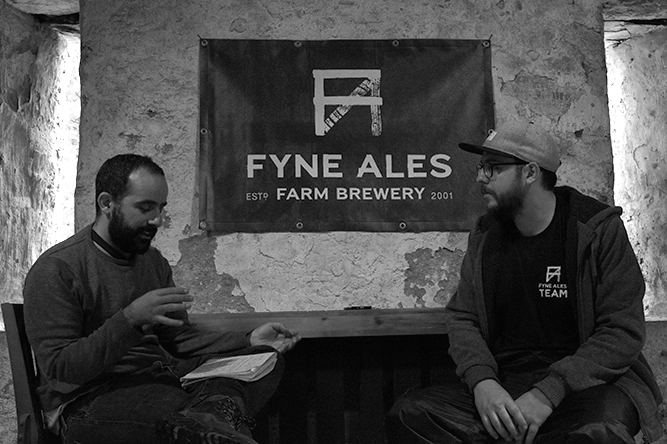
How did a dairy farm in Western Scotland became a brewery?
Iain: So Fyne Ales was found in 2001, but the history of the glen goes back a lot further. It's been our family’s farm for six or seven generations. Tuggy—the founder—grew up on the farm. Her dad was a farmer. But as she got older, she moved to London, where she met her husband, Johnny. As they both approached retirement, Johnny thought that his health wasn't going very well. So they took early retirement and decided to do something that would bring jobs and tourism industry money back into the area.
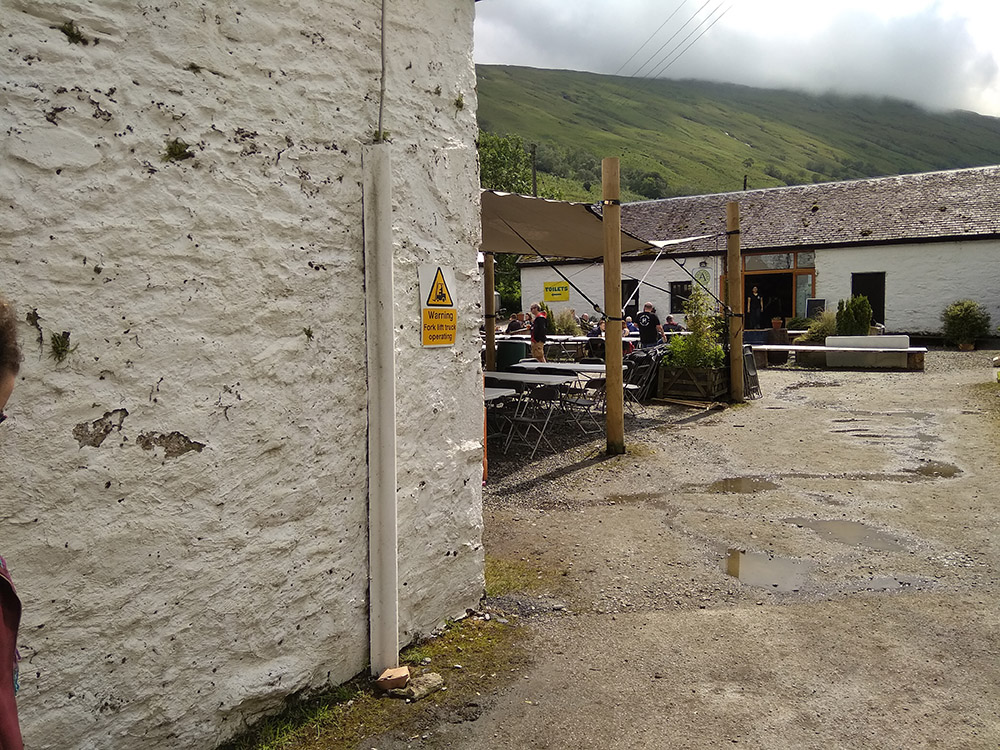
Still, while she was away from it the land was still in use by the farmers. But, it was basically a family state. And it wasn't fulfilling its potential. So they came back and they looked at options like smokery, doing smoke fish—and even making candles.
It’s a long way from making candles to organize a beer festival.
“Eventually they turned to beer. Johnny was a good drinker and there wasn't enough good beer in Scotland back in 2001.”
Iain: Yeah. So eventually they turned to beer. Johnny was a good drinker and there wasn't enough good beer in Scotland back in 2001. So, they started a brewery—the original brewery was a dairy building which was converted. We got started and our first brew was on St. Andrew's Day in November 2001.
And we’ve been brewing ever since. And when John passed away, his son Jamie came back to Scotland to take over the business—Tuggy is right now retired of brewing, but she still runs the farm.
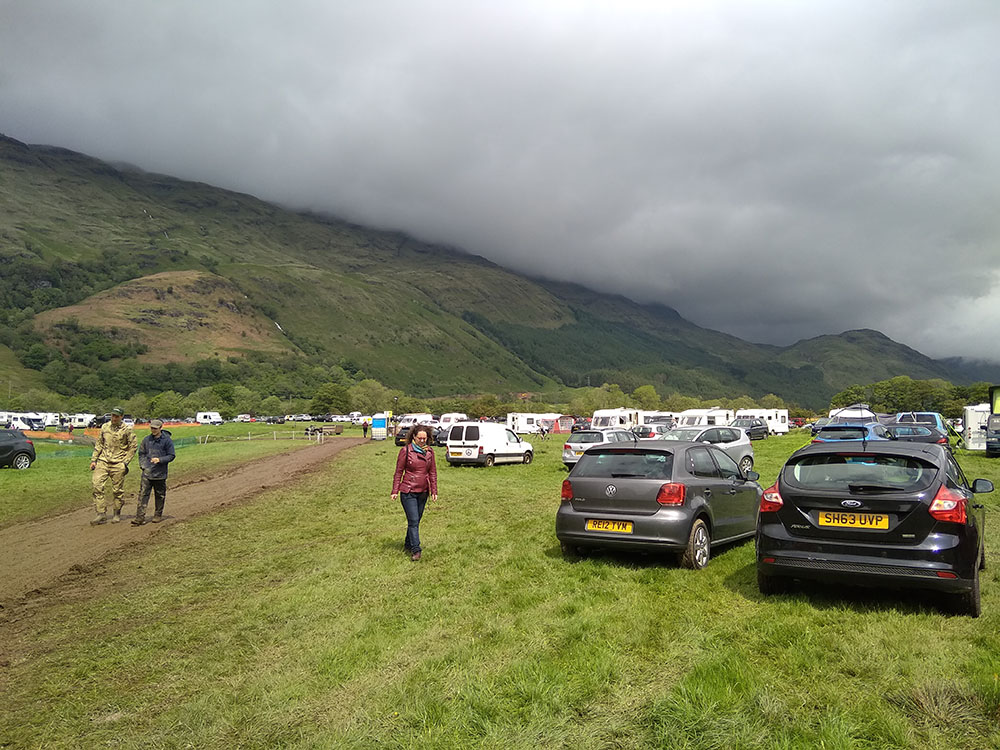
We're a farm brewery and we're very proud of the fact that we have red deer, a herd of cattle, a salmon river—we're running a restocking project. And the farm and the brewery have a symbiotic relationship. They work very well. Spent grain, goes directly to the animals. It's not like we're an industrial state or a railway arch. We've got a real unique proposition in terms of the amazing scenery, the farm and… our beers are quite good!
You recently opened a new factory.
Iain: It was a big project, because we had to tear it down and start again. There were no foundations underneath it. So it was a huge investment in kind of building a kit that would allow us to make the beer we do best.
How do you see the Scottish craft beer scene?
Iain: When we started back in 2001, craft beer wasn't even a thing in the UK. There was just real ale, and there was… lager.
“Love him or hate him—you can't deny the influence Brewdog has, as a Scottish brewery.”
So yeah, we were very much in that space, making cask beer, a very good cask beer. But as craft beer scene evolved, we also had to evolve as a business, and we started doing different styles. In Scotland we have a huge range of very, very talented brewers and would benefit a lot from the Heriot Watt University, that makes a MSc in Brewing and Distilling.
So there's a constant flow of very talented and qualified breweries coming through Scotland. So yeah, I would say Scotland has an amazing brewing scene.
And love him or hate him—you can't deny the influence Brewdog has, as a Scottish brewery. When you think on Scottish brewing, Brewdog is probably the first one you think about.
Do you think that Brewdog is, in some way, leading the ecosystem?
Iain: Yeah, for sure. They were the first ones to grow big. They really kind of helped pave the way. I think a lot of breweries, have benefitted from what they've done to the Scottish brewing environment.
You won several times the Champion Beer of Scotland, according to the CAMRA.
“Cask ale is part of the British brewing heritage.[...] It's something we're proud to be doing and doing well.”
Iain: Cask ale is part of the British brewing heritage. So I still part of our production—about 65% of our production in cask ale. So we've always brewed in cask, we sell casks, and they’re doing well. It's something we're proud to be doing and doing well.
Do you sell casks just in the UK or do you export any of them?
Iain: No, we export. Our better performing markets are USA and Italy. Italy is a real cask market, it's very interesting. They love it. They love cask beer.
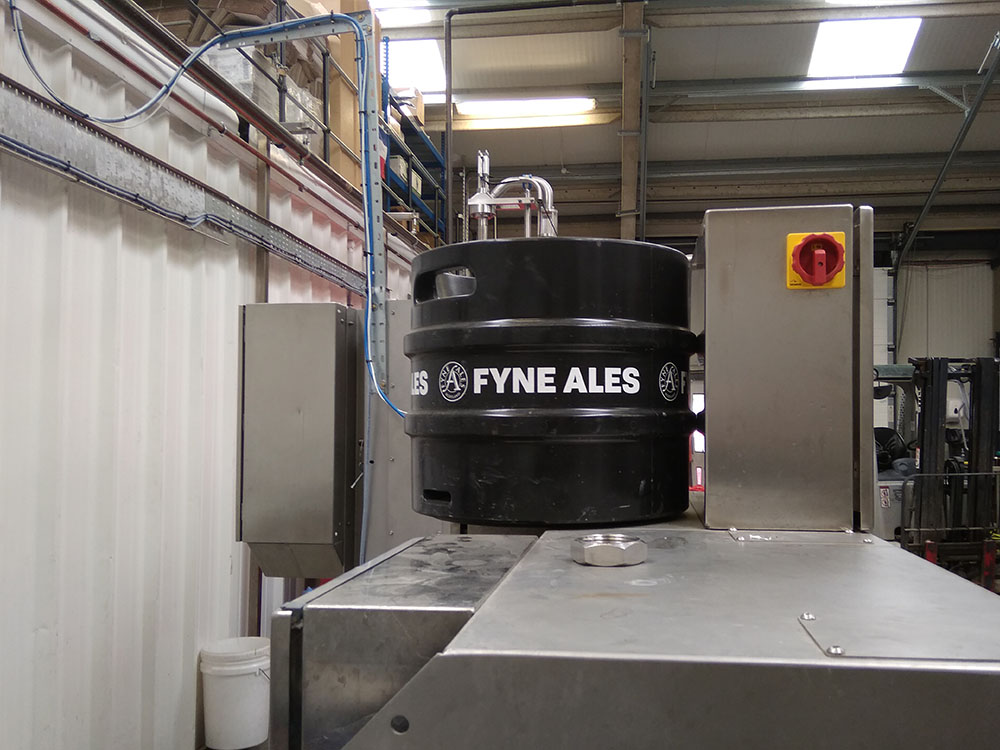
Actually, CAMRA is one of these kind of divisive things where somebody will think it's a waste of time and then somebody goes very, very passionate about it. But for us, it's been really useful to be able to put Champion Beer of Scotland out on our beers. It's still a sign of quality. Still, it's something that a lot of drinkers really respect.
What about the influences from traditional English and Scottish styles. How do they influence your beer?
Iain:Our core of year-round classic beers are very much of an English style. One of our core beers is Jarl. It's a single hop citra beer. It's got a very English backbone. It's a very simple beer, but very, very popular. Our first brew back in 2001 was Highlander—we still make that now—it's a traditional Scotch Amber ale, 4.8 ABV, rich and malty with a nice bite and finish. It kind of stands for me as a British modern classic.
“Some breweries may say “oh, put it in whisky barrels, and Americans will buy it”. But for us, if we’re going to make something Scottish, it has to be good.”
Scottish styles. We're going to dabble in a little bit. We use whisky barrels from Springback Distillery for our Origins Project. Some breweries may say “oh, put it in whisky barrels, and Americans will buy it”. But for us, if we’re going to make something Scottish, it has to be good. We can’t just throw something in a whisky barrel and hope that Americans will like it.
So at the moment, we've got a collaboration with Cigar City from USA, it’s a dark barley wine, I think it’s about 11.5%. It’s been nearly a year now. I think actually it's going to be nice and rounded, it's a good one.
What about another Scottish ingredients?
Iain:We use mixed fermentation on the Origins Project. We try to work with fruits from Scotland—as many as we can. Hops, we don't have the climate, unfortunately. But we do use Scottish malt as much as we can.
How do you work with mixed fermentation?
Iain: With the Origins Project, we wanted to do something that was an expression of where we are, where we come from—this beautiful glen that we got here.
“It was also about this crazy line between art and science. We want to ride the middle of that and figure out what works and what doesn't.”
It was also about this crazy line between art and science. We want to ride the middle of that and figure out what works and what doesn't. It's a really fun project to be part of. We do make the fermentation in the old brewery, which we’re still running. And we use wine barrels. Jamie—our boss—says he wants to give a sense of a place in a glass. You take a bottle, you have the first sip, and you’re transported somewhere further—that’s what he wants. And so far, the reception has been really, really good.
You recently did a beer—Origins Succesion— with a Celtic roots ingredient, the Meadowsweet. Tell us a bit about it.
Iain: It was very good—and very divisive. Meadowsweet has the same ingredient than Aspirin. It used to be a treatment for headaches. But yeah, it has a very unique flavour and something just like Aspirin. But it also has lots of other things going on.
So it is kind of related with nature as well, like the farm, the salmons, the kettle…
Iain: I would say that we're trying to keep the ecosystem as tight as we can because, you know, we want to take care of the farming families. We have solar power for our offices. We use water for the hills. We have my running water here. We bring streams from the hills, we filter and we brew with it.
“We're trying not to be a burden on this amazing place. We want to enhance it.”
We've got about 200 head of red deer. I think we're about 75 herd and kettle around. The salmon river is a private river. A few years ago, we restocked it with new salmon to get the numbers back up. We want to take care of it. Our own waste from the brewery is processed, then is filtered back out and it goes out completely neutral. Then it filters back out through the reed beds into the river.
So we're trying not to be a burden on this amazing place. We want to enhance it. You know, we want the brewery and the farm to work together.
And you’re trying to develop local jobs as well.
Iain: Our team now is about 20-25 people. Most of them are from the local area. Our brewer is literally from the glen, something like from the cypress down the hill, which is really cool.
It's a good little team. And as we grow, if we see that there's a skill gap in what we're doing, then we try and bring someone in who can fill that gap—but also give something back to the community. And we were trying to encourage locals to come and see us as much as possible—tickets for the festival, reduced rates if you live nearby... This is not just a celebration of Fyne Ales brewery, but of this little corner of Scotland that we call home.
Could you tell me a bit more about your water supply? How do you get the water from the mountains?
“It fills into a small stream that runs down the mountain, and we capture it, filter it and brew with it.”
Iain: It fills into a small stream that runs down the mountain, and we capture it, filter it and brew with it. There's no running water on toilets, just rainwater. That's amazing. And it's completely safe—we've tested it. Yeah, we're the middle of nowhere. What do you expect? It's amazing that we've got the Internet [laughts].
Finally, tell us a bit about the Fyne Ales Festival. How were the beginnings?
Iain: It started off 10 years ago with about 300 people—just a very small get together. It was basically us and some other breweries who are friends getting together with their food and music and having a laugh. And we try to stick to that.
We've grown up—we were 3000 people this weekend, which is ten times the size, but it's still the same thing. It's still just us and our mates having some good beers and good music and some good food and trying to stay dry from the rain. And when you see the smiling faces and people dancing to their homes. Yeah. This is what it's all about.
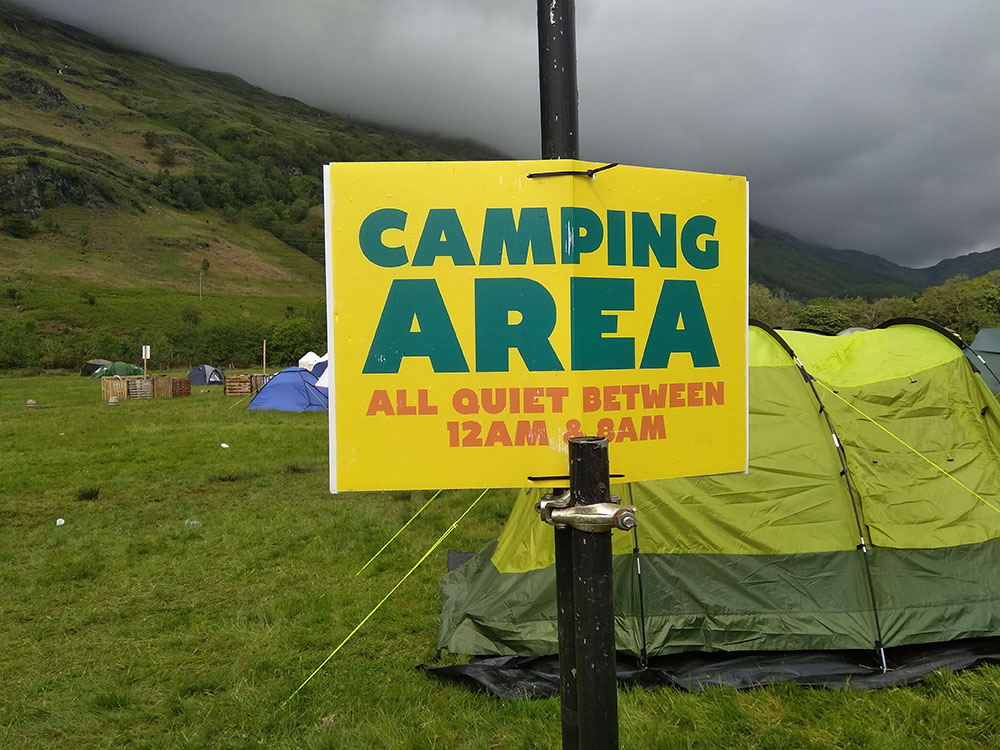
It's just fun. It's what we're here for.
And it also gave us a chance show off on location because it is such an important thing to us. We want to bring people here and be like, come and see yourselves.
“ We want to bring people here and be like, come and see yourselves.”
It's a beautiful place and a beautiful country. Every time somebody comes up here, they're like, “I need to come back next year, do a collab or whatever”. And we're just like, “yeah, please do”. This place is part of who we are. So we're very happy to share it with people.
There were also lots of things going on about cider in the Festival.
Iain: We don't produce cider. But one of our brewers... I think he likes cider more than beer. So he brews for a living, but he is a massive cider geek. He absolutely loves cider. So we've got about 30 different ciders for this weekend. A couple months before the festival, we tell him “Chris, I need some cider”. And he just goes away and comes out with a list. And it's usually incredible. Like we get people who come up and all they want to drink is cider. We have about two hundred thirty five different beers here. But they just want to drink cider, which is amazing.
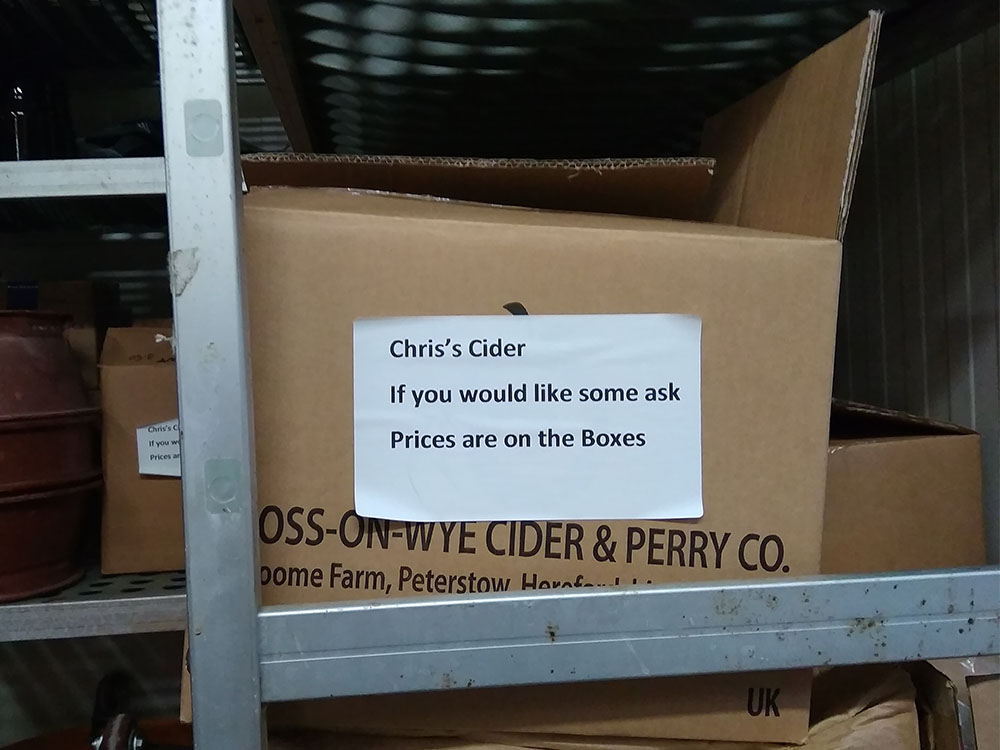
We have some really good natural ciders. Then we have the fruity stuff like rhubarb ciders. We have a gingerbread one this year, which is just a gimmick—people like that kind of things. It's just something interesting and different.
I'm more on the natural side of kind of side of things with guys like Oliver's and White Rose, who are making really interesting low intervention ciders with real complex flavours. And there's a real crossover between that and what we are doing with Origins in terms of production methods and simple and very authentic and sense of place. So yeah, it's Chris, he does the ordering and he knows his stuff.
What are your future plans for the Festival and also as a brewery?
Iain: We brewed a couple of collabs for the festival. We have a collab with Magic Rock on the tap, a nice hoppy pale ale. We did another collab with Ridgeside—a Fruity IPA which unfortunately wasn't ready for the festival.
“This year's Fyne Ales festival has been very succesful in a lot of ways despite of the weather. But at the same time, if you don't evolve you get left behind.”
But yeah, people love coming here and hang out in the scenery. So, we do lots of collabs, we just went down to Salt Brewing in Saltaire. We like that brewing industry is a really collaborative industry. Imagine you work for like a washing machine company and you came up with a way of washing clothes better than anyone could ever wash clothes. You'd locked that down, you'd trademark it and you wouldn't share it with anyone. In brewing, if someone does something interesting—they're immediately on the phone. “Have you tried this? Yeah, that's. There's something new. There's new hop out or there's a new adjunct out.” Everyone just wants to share ideas and knowledge.
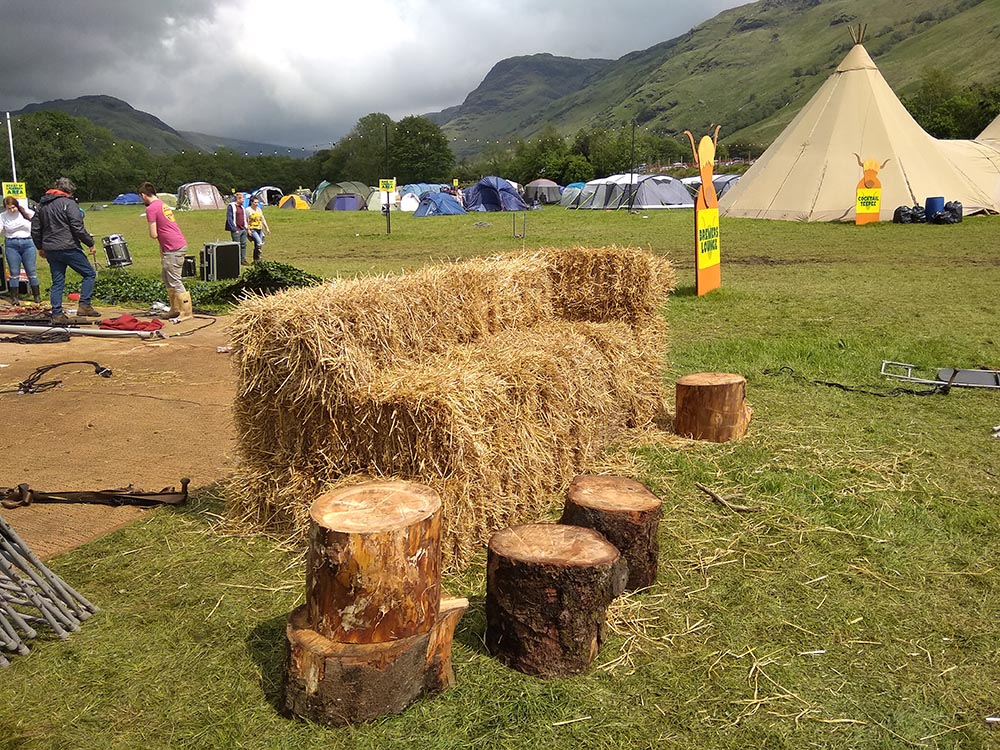
I think a lot that comes with the idea that, you know, craft is still a very tiny part of the market. And we're all in this together against Big Beer. No longer is still the most popular thing in the US. I think that spirit of collaboration comes with this idea that we want to make the best beer possible. And, you know, we want people to enjoy it. We want people to appreciate and enjoy it more than, cheaply produced beer that doesn't have that kind of sense of integrity.
And we've got some collabs coming. One of them is with Harbour a brewery that is much into mixed fermentation. We'll be doing something this year with Left handed Giant Dan Bristol—there's a list, and we just go through it.
About the festival, this year's Fyne Ales festival has been very succesful in a lot of ways despite of the weather. But at the same time, if you don't evolve you get left behind. We will look after this one, what things we can do better. And maybe we will look if the exact Summertime Festival is the right thing for us. Right now is hard to say—we'll let the dust settle, and come back to it. But it feels me like it's time for a change of what the Fyne Fest is. But it's been a very fine festival. But I think it's time to look into what we can do to improve the Fyne Fest.